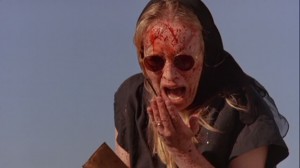The Reflecting Skin
 No matter how much a filmmaker might protest, laughable and incoherent content should never be excused as elliptical, complicated symbolism. Take a movie like Zack Snyder’s Sucker Punch; on the surface, it’s a story about young girls who are forced to become prostitutes so they can avoid being lobotomized. The movie is told through the eyes of a mostly silent character named Baby Doll who dresses like Sailor Moon, and has been committed to an institution by her stepfather trying to steal her inheritance. This institution doubles as a whorehouse and occasionally a strip club, and so, when told to perform on stage, Baby Doll drifts into a dream state where she imagines herself and the other prostitutes battling against fiery dragons, Nazis, and robots made of hot air. Ludicrous, yes, but underneath that is something considerably more reprehensible, a tawdry mess of constantly threatened and sometimes realized rape, pedophilia, and child abuse, amongst other things. It’s positioned as a feminist tale, but in reality, it’s just an excuse to ogle young girls in short skirts being repeatedly assaulted for our pleasure. It’s also a thoroughly unpleasant movie to look at and listen to.
No matter how much a filmmaker might protest, laughable and incoherent content should never be excused as elliptical, complicated symbolism. Take a movie like Zack Snyder’s Sucker Punch; on the surface, it’s a story about young girls who are forced to become prostitutes so they can avoid being lobotomized. The movie is told through the eyes of a mostly silent character named Baby Doll who dresses like Sailor Moon, and has been committed to an institution by her stepfather trying to steal her inheritance. This institution doubles as a whorehouse and occasionally a strip club, and so, when told to perform on stage, Baby Doll drifts into a dream state where she imagines herself and the other prostitutes battling against fiery dragons, Nazis, and robots made of hot air. Ludicrous, yes, but underneath that is something considerably more reprehensible, a tawdry mess of constantly threatened and sometimes realized rape, pedophilia, and child abuse, amongst other things. It’s positioned as a feminist tale, but in reality, it’s just an excuse to ogle young girls in short skirts being repeatedly assaulted for our pleasure. It’s also a thoroughly unpleasant movie to look at and listen to.
 Snyder, who also directed 300 and Watchmen, has defended the film, his first wholly original work, as a commentary on fanboy ogling, as well as having a girl power undertone, on top of commenting on the delusions of those who might enjoy video games and the look of teenage girls in Catholic School garb, but wants to justify their lust by making the object of his affection a legal, consenting age. Ok, so I made that last justification up, but it’s pretty much what’s going on during Sucker Punch, which can only get away with being just a terrible movie if you don’t choose to explore the unintentional subtext.
Snyder, who also directed 300 and Watchmen, has defended the film, his first wholly original work, as a commentary on fanboy ogling, as well as having a girl power undertone, on top of commenting on the delusions of those who might enjoy video games and the look of teenage girls in Catholic School garb, but wants to justify their lust by making the object of his affection a legal, consenting age. Ok, so I made that last justification up, but it’s pretty much what’s going on during Sucker Punch, which can only get away with being just a terrible movie if you don’t choose to explore the unintentional subtext.
 Such contradictions might come up to a viewer during a screening of Philip Ridley’s The Reflecting Skin, but he betters Snyder since Ridley is actually willing to deal with tough subject matter instead of cloaking it in music video visuals and violence. The Reflecting Skin is tough to take literally, especially as it spirals out of control in its final act. Is Ridley suggesting that his main character, Seth Dove, a boy around the age of 8, has suffered enough throughout the film and so everything we see in the last 25 minutes of the film are his mind protecting itself from lapsing into complete sanity and a figment of his imagination, a la Sucker Punch? That might explain Jeremy Cooper’s utterly erratic performance as Seth. First Cooper plays Seth like a naïve, malevolent dope, extremely susceptible to suggestion and peer pressure. Suddenly, he seems to make his own decisions, having an overall Zen approach towards the outcome of the characters that he knows are doomed. Then he’ll have an outburst. Then….
Such contradictions might come up to a viewer during a screening of Philip Ridley’s The Reflecting Skin, but he betters Snyder since Ridley is actually willing to deal with tough subject matter instead of cloaking it in music video visuals and violence. The Reflecting Skin is tough to take literally, especially as it spirals out of control in its final act. Is Ridley suggesting that his main character, Seth Dove, a boy around the age of 8, has suffered enough throughout the film and so everything we see in the last 25 minutes of the film are his mind protecting itself from lapsing into complete sanity and a figment of his imagination, a la Sucker Punch? That might explain Jeremy Cooper’s utterly erratic performance as Seth. First Cooper plays Seth like a naïve, malevolent dope, extremely susceptible to suggestion and peer pressure. Suddenly, he seems to make his own decisions, having an overall Zen approach towards the outcome of the characters that he knows are doomed. Then he’ll have an outburst. Then….
 Luckily Ridley is a much more composed filmmaker than Zack Snyder, focusing on the world from Seth’s point-of-view, rarely framing a shot from anything above Seth’s eye level. In fact, Ridley loses control of the film when he shows us things Seth could never have seen, such as a scene between Viggo Mortensen, as Seth’s brother Cameron, cavorting with Lindsay Duncan’s Dolphin Blue, resulting in what looks an attempt by Ridley to emulate his favorite Impressionist paintings. Besides, when you give a character a name like Dolphin Blue, and you’ve already saddled with her a dead husband she didn’t really know which causes her to lose her grip on reality and the suggestion that she might be a 200 year-old vampire, you should probably suggest that she’s mostly a representational figure.
Luckily Ridley is a much more composed filmmaker than Zack Snyder, focusing on the world from Seth’s point-of-view, rarely framing a shot from anything above Seth’s eye level. In fact, Ridley loses control of the film when he shows us things Seth could never have seen, such as a scene between Viggo Mortensen, as Seth’s brother Cameron, cavorting with Lindsay Duncan’s Dolphin Blue, resulting in what looks an attempt by Ridley to emulate his favorite Impressionist paintings. Besides, when you give a character a name like Dolphin Blue, and you’ve already saddled with her a dead husband she didn’t really know which causes her to lose her grip on reality and the suggestion that she might be a 200 year-old vampire, you should probably suggest that she’s mostly a representational figure.
 Despite being unfortunately named, Dolphin Blue is really the most important character for developing Seth’s maturity. Ignoring his paranoid mother, his introverted, closeted father, his withdrawn older brother*, unaware he’s suffering from the effects of nuclear testing, the greaser pedophiles who arrive, not coincidentally, like The Four Horseman of the Apocalypse, the local sheriff outfitted like John Wayne in True Grit and prone to molestation and/or intimidation, or his young friends, Dolphin Blue is the only palatable, relatable person for Seth. She often behaves like a child, and encourages Seth’s mischief**, while introducing him to the notion of suicide via her descriptions of her late husband and how to express despair, judgment be damned. It’s Dolphin Blue who puts us in the position of wondering whether or not Seth is the actual villain of the story, and those around him are simply bowling pins waiting to be mowed down by his uncontrollable outbursts.
Despite being unfortunately named, Dolphin Blue is really the most important character for developing Seth’s maturity. Ignoring his paranoid mother, his introverted, closeted father, his withdrawn older brother*, unaware he’s suffering from the effects of nuclear testing, the greaser pedophiles who arrive, not coincidentally, like The Four Horseman of the Apocalypse, the local sheriff outfitted like John Wayne in True Grit and prone to molestation and/or intimidation, or his young friends, Dolphin Blue is the only palatable, relatable person for Seth. She often behaves like a child, and encourages Seth’s mischief**, while introducing him to the notion of suicide via her descriptions of her late husband and how to express despair, judgment be damned. It’s Dolphin Blue who puts us in the position of wondering whether or not Seth is the actual villain of the story, and those around him are simply bowling pins waiting to be mowed down by his uncontrollable outbursts.
 How does Ridley balance all of these varying layers? He doesn’t really, but he was smart enough to open The Reflecting Skin with one of the vilest opening scenes ever, putting the viewer in a state of shock for the first ten minutes while he sets up the aw-shucks David Lynch squareness of the isolated farming town in the Midwest of the 1950s. It’s obvious from the various female villagers chanting religious verse and screaming angrily at those who might be at the center of the cases of child disappearances that the Sheriff is desperate to solve that The Reflecting Skin was very influential on Neil LaBute’s ill-fated remake of The Wicker Man. And Ridley himself is indebted to Terrence Malick’s striking nature imagery and childlike worldview. But really, and Ridley admitted as much in interviews, the strongest influence on The Reflecting Skin was Alice in Wonderland, which is the easiest way for Ridley skate out from underneath the often histrionic acting and melodrama that is so pervasive throughout the film.
How does Ridley balance all of these varying layers? He doesn’t really, but he was smart enough to open The Reflecting Skin with one of the vilest opening scenes ever, putting the viewer in a state of shock for the first ten minutes while he sets up the aw-shucks David Lynch squareness of the isolated farming town in the Midwest of the 1950s. It’s obvious from the various female villagers chanting religious verse and screaming angrily at those who might be at the center of the cases of child disappearances that the Sheriff is desperate to solve that The Reflecting Skin was very influential on Neil LaBute’s ill-fated remake of The Wicker Man. And Ridley himself is indebted to Terrence Malick’s striking nature imagery and childlike worldview. But really, and Ridley admitted as much in interviews, the strongest influence on The Reflecting Skin was Alice in Wonderland, which is the easiest way for Ridley skate out from underneath the often histrionic acting and melodrama that is so pervasive throughout the film.
That’s not an excuse though, just a thin explanation. At least Ridley didn’t put Seth in a series of Catholic School Girl skirts.
 * It makes perfect sense that with his screeching, overbearing mother, that Cameron is such a mumbler.
* It makes perfect sense that with his screeching, overbearing mother, that Cameron is such a mumbler.
** It’s a shame that the title Children Shouldn’t Play With Dead Things was already taken.



